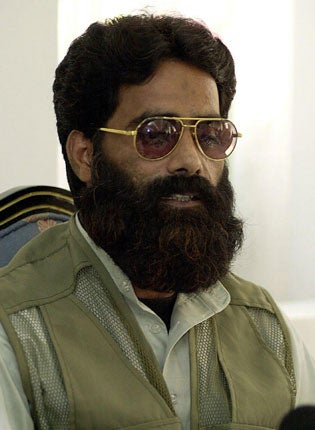Pakistan is '98% sure' US drone killed militant leader

The reported killing of Ilyas Kashmiri – a high-profile al-Qa'ida leader who had even been tipped to assume the top spot – by a CIA drone in Pakistan's South Waziristan province marks a major success for Washington, coming just over a month after the death of Osama bin Laden.
The Pakistani Interior Minister said yesterday that he was "98 per cent" sure Kashmiri was killed in the strike on Friday. A video of a corpse resembling the terrorist leader was released and his organisation, Harakat-ul-Jihad al-Islami, vowed to take revenge.
Kashmiri has outlived previous reports of his demise but, if confirmed, his killing may help to ease the strained relations between Islamabad and Washington. The drone strike followed a visit by the US Secretary of State, Hillary Clinton, to the Pakistani capital on 27 May. During that trip, she shared a list of five senior militants that the US would like to pursue with Pakistan's help. Kashmiri was on the list. The others included the Afghan Taliban leader Mullah Omar and Osama bin Laden's deputy, Ayman al-Zawahiri.
The CIA has been running drone strikes almost daily since Bin Laden's death in an effort to capitalise on the disarray believed to have spread among al-Qa'ida's ranks. But their use has been met with opposition from the Pakistanis, and some US officials have been arguing for a slowdown.
Since mid-March, after the powerful army chief General Ashfaq Parvez Kayani publicly condemned a drone strike that he alleged killed innocents, there has been a loud chorus demanding an end to CIA-operated strikes in Pakistan. Leaders of every political party have echoed the army chief's denunciation, while the cricketer turned politician Imran Khan has held public protests against them.
In the days leading up to the strike that claimed Kashmiri, there were reported divisions among senior US officials over the pace of the strikes. Arguing for a slowdown, one group of US officials wanted to repair frayed ties with Pakistan and win its co-operation as the two sides move towards an endgame in neighbouring Afghanistan.
It is unclear whether there was any co-operation from the Pakistanis in Friday's strike. Pakistan will have been relieved to see the back of Kashmiri, responsible for killing many of its citizens.
What is less certain is whether Washington will be able to use the strike as a cue to secure greater convergence with the Pakistani security establishment. Pakistan realises that the US is dependent on it to secure supplies for Afghanistan and target "high-value" militants through drone strikes.
The Pakistanis are nervous about the endgame in Afghanistan. Military officials play down the extent to which they are perceived to have influence over the Afghan Taliban and the Haqqani network. They would not like to be excluded from the direct negotiations that some members of the Afghan Taliban are starting with the United States.
And, stinging from the embarrassment of Bin Laden's discovery in Pakistan, they are keen to demonstrate visible commitment to fighting al-Qa'ida on their soil. So far, they have resisted demands for an operation in North Waziristan, but Kashmiri's death could possibly lead to greater co-operation against other terrorist leaders.
A more immediate consequence of the strike came late yesterday, as at least 24 people were killed in two separate bomb attacks in north-west Pakistan. Militants had earlier vowed to avenge Kashmiri's death.
Subscribe to Independent Premium to bookmark this article
Want to bookmark your favourite articles and stories to read or reference later? Start your Independent Premium subscription today.

Join our commenting forum
Join thought-provoking conversations, follow other Independent readers and see their replies